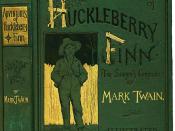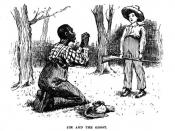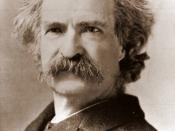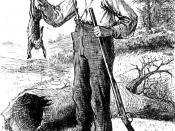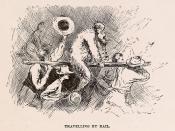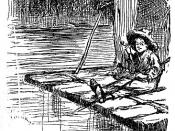Mark Twain, who wrote "The Adventures of Huckleberry Finn, remains one the most fascinating and complicated authors of all time. He wrote this book partly based upon his childhood experiences growing up in a small town of Cannibal, Missouri. Mr. Twains own adventure for life was much as his character Huck Finns life was portrayed, a person who had to continually be on the go and experience life to it's fullest. Huck Finn is a boy who experiences many things in life such as: friendship, a broken home, prejudice, adventure, pain, struggles, and much more. "The Adventures of Huckleberry Finn", is a novel that has brought out the kid in some people who read it, and in others, it is a book that tends to be on the racist side at times.
When one reads the very first page of Twains book, a sense of adventure and mystery can be readily found.
Huckleberry Finn starts off by describing how his adventures in life had all begun. He and his friends form a gang, first by writing their name in blood and second, by taking an oath that vows to never reveal their secrets to anyone. If one reveals their secrets to anyone, they would be killed and their family would be killed also. At first glance while reading this page, it would seem as though Huck Finn was a boy who was a killer and one with no conscience, but it is mearly describing a boy who was in the beginning of a great adventure, yet to take place.
"The Adventures of Huckleberry Finn," takes place during a period in a young boys life, when he is trying to find out who he really is and trying to find a place that he can call home. Mark Twain is thought of, by some critics, as being an author who is describing the adventures of a boy, in a racist sort of way. One critic states: "Huckleberry Finn is a book that is absolutely immoral in its tone, it also seems to contain but very little humor. It was couched in the language of a rough, ignorant dialect, racism runs ramped, and all through its pages there is a systematic use of bad grammar and an employment of inelegant expressions." Another critic goes on to say "The book is flippant and trash of the veriest sort. It deals with a series of experiences that are certainly not elevating, it portrays blacks in a negative light, and it should not be tolerated in the public library." Personally I do not find this book to be immoral in its tone or full of trash. Mark Twain is describing some of the hardships and struggles that a young boy faces in life. If describing experiences that deal with life, and how a boy overcame them are immoral and trashy, then I guess these critics who put down this book are the most perfect people in the world and have never faced any major problems in their life. Sure, not all people run away from home and float along the Mississippi River but there are many people who have problems such as: broken homes, finding friendship, being educated, and many other problems that Huck Finn experienced. These critics also believe the book to be full of racist remarks about blacks. They believe that Mark Twain is portraying Hucks friend Jim, who is black, in a negative and racist way. They believe that blacks are being put down, made fun of, and looked upon as a lesser human being. It is true that blacks are looked at in a different light in this book, but all you have to do is look back in time and realize that how Mark Twain describes blacks is the way it was back in the 1800's. Blacks were slaves to white people and while there is no excuse for this practice, Mr. Twain is simply creating an atmosphere that was true to the books time period in which it was taking place. One of the great black novelists, Ralph Ellison, noted how Twain allows the character, Jim, to be portrayed with "dignity and human capacity" in this novel. Ellison goes on to say, "Huckleberry Finn knew, as did Mark Twain, that Jim was not only a slave but a human being and a symbol of humanity...and in freeing Jim, Huck makes a bid to free himself of the conventionalized evil taken for civilization by the town"--in other words, of the abomination of slavery itself.
As noted by another supporter of Twains book, "There are only a few instances which go to show that this is not a boy's book and does not fall under the head of flippant and worthless literature. Of its humor nothing need be said. There is a large class of people who are impervious to a joke, even when told by as consummate a master of the art of narration as Mark Twain. For all these the book will be dreary, flat, stale and unprofitable. But for the great body of readers it will furnish much hearty, wholesome laughter." Mark Twain did not write this novel to portray black people in a negative light. He painstakingly sought out the truths as to how blacks were treated, what their education level was, how they faired as human beings, and how the blacks were an important part of society. Twain could be found on occasion actually putting down white people and elevating the status of blacks. He was quoted as saying, "Nearly all black and brown skins are beautiful, but a beautiful white skin is rare." He also goes on to say "One of my theories is that the hearts of men are about alike, all over the world, whatever their skin- complexions may be." So Mark says in the first quote that blacks are more beautiful than whites. If one has lived in the southern states, where Huck experiences his adventures, one can then appreciate the art with which the dialect is managed by Mark Twain. Here Twain writes about a boy and his astonishing series of adventures with a runaway Negro. Twain has overlaid this novel with an embroidery of jokes, sketches and sarcasm. Hucks story really forms the least part of the novel.
Huckleberry Finn is the son of a worthless, drunken, poor white man. He is troubled with many disparities of his conscience because of the part, he soon takes, in helping the Negro Jim to gain his freedom. While Huck helps Jim and himself gain freedom, they both create a powerful friendship between one another, between black and white. This is a story about two different races coming together and showing the world that a black man and a white man can work together, that they can overcome the color barrier, and that they can become great friends with one another.
Hucks father has abandoned his son and left him with a person by the name of widow Douglas to care for him. Huck struggles living with the widow Douglas at first because he's accustom to a life of disorder and abuse. The widow Douglas tries to conform him into a proper and obedient young man. I know that when I was young, I went through the same struggle of having someone trying to make me into the perfect little child. I had someone there telling me what was proper and what was not. I had someone watching over me and making sure that I did not get into any trouble. Huck also struggles because of the fact that he takes things to literally. This not only adds to the humor of the book, but it also lets some of the books deeper messages come through. In one of the first scenes of the story, Huck is struggling to understand the concepts of Miss Watsons ( who is the widow Douglas's sister) heaven and hell. He finds her strange view of heaven boring and he wants to be in an exciting place. When Miss Watson tells Huck that he will get anything he prays for, he takes it very literally and decides to pray for fishing line, which he gets, but praying for fishing hooks didn't seem to work. When he asks her to pray for him to get some fishing hooks she calls him an idiot. I think this is a very amusing part of the book because I have known children who have this same idea that whatever the pray for, God will give them. I have known kids to pray for such things as a new Nintendo, a new bike, and even a new sister. Young minds sometimes are clueless to the things of the world and therefor they can be influenced very easily at times. The widow Douglas tries her best to conform Huck to her ways and almost succeeds in doing so.
Just as fast as Hucks father left him, his father got word that Huck ran into a large amount of money and came crawling back to take back Huck, and his money. One point to mention is how Mark Twain describes his characters in such a detailed manner. Take for instance the way he describes Hucks father, (as directly quoted from the book), "He was most 50, and he looked it. His hair was long and tangled and greasy and hung down, and you could see his eyes shining through it like he was behind vines. It was all black, no gray; so was his long mixed-up whiskers. There warn't no colorin his face, where his face showed--it was white; not like another man's white, but a white to make a body sick, a white to make a body's flesh crawl--a tree-toad white, a fish-belly white. As for his clothes--just rags, that was all." Twain is very meticulous and brilliant in describing this man whom Huck dreads to be around. As I read the description of Hucks father and then read how his father wanted him back, it gave me the chills as to what his father may do to him once he was living with him. So many times in our lives, people run away from us and leave us for not when the first sign of trouble is afoot. Hucks father did not want to take care of him because he felt as though it was too much of a burden and that Huck wasn't worth the trouble in sticking around for. There have been many times in my life when a so called friend or family member claims that they are there for me during the good times, then when the slightest bit of calamity hits my life, in a flash, those people are no where to be seen.
Somehow Huck is made to go and live with his father once again. His father only wanted Huck so he could get the money that the Judge was holding for Huck. The old man tries many times to get the money, but each time fails. Through much continued emotional and physical abuse by Hucks father, he develops a plan to run away and never be seen again. As a child we all have problems that we wish we could run away from and never encounter again. We dream of places far away that we think will make us all better. Huck acts out on that desire for a better place and runs away to find that haven that we all wish to have. Huck Finn is a strong-willed character that goes through much in life and never gives up. He is a person that one can look up to for courage and strength. The first time that I read this book, as a child, I admired Huck for his courage and he gave me hope when I had trials in my own life. Twain personifies a mystic and power in this young boy, Huck Finn. A power that anyone can feed upon for hope in their own lives.
After Huck escapes from his father, he finds refuge on a small island down the river from his home. There he falls upon a person whom he shares his whole adventure with, Jim, the runaway Negro from his first home at Miss Watson's place. Jim has just ran away because he heard talk of his owner selling him to someone in New Orleans. They hide on the island for a couple of days and all seems to be going well. Huck then decides to head into to town to check things out. He dresses up as girl so no one can recognize him. He then comes across a little old lady who is new to the town. Twains humor can be found in this episode as the old woman discovers that this supposed girl is really Huck. I like how the character reacts to this discovery. She doesn't get upset and start yelling and screaming like one would suspect. She says to Huck "Don't you go about women in that old calic. You do a girl tolerable poor, but you might fool men maybe." She also realizes who he really is while Huck is threading a needle and also when he throws something at a rat. She goes on to say, "Bless you, child, when you set out to thread a needle, don't hold the thread still and fetch the needle up to it. Hold the needle still and poke the thread at it--that's the way a woman most always does it, but a man always does tother way. And when you throw at a rat or anything hitch yourself up a tiptoe and fetch your hand up over your head as awkward as you can, and miss your rat about six or seven-foot. Throw stiff-armed from the shoulder, like there was a pivot there for it to turn on--like a girl, not from the wrist and elbow, with your arm out to one side, like a boy." This old lady has been lied to by Huck and has every right to be angry at him but instead begins to tell him how to act like a girl so he will be more convincing to others. This is great humor on the part of Twain. He attempts to have his characters find humor in this circumstance, which could have turned very sour for Huck.
Huck finds out through the old lady that people are going to be looking for Jim on the island at midnight. So Huck returns to the island so Jim and himself can pack their belongings and leave in safety. When Huck discovers that people are going to be looking for Jim on the island, he shows us how much he cares for Jim. Huck could have easily just left Jim there and not warned him about the people that were looking for him. Instead he does all he can to get to the island and get Jim to safety. This is the first scene in the novel that really helps me to understand the strong friendship that is beginning to form between Huck and Jim. This part of the book brings to light the true nature of Huck Finn as a human being. Throughout the first of the book, I thought Huck Finn would not be a very caring person toward others because he seemed to be so independent and self sufficient that he seemed to not need anyone else. Huck reveals a caring and kind side to him when he warns Jim about trouble coming. I come to find what type of a truly caring person Huck is because of his struggle that he has with his conscience in regard to slavery. His conscience tells him, the way it has been instructed, that to help the runaway, nigger, Jim to escape-to aid in stealing the property of the widow Douglas, who has never injured him, is an enormous offense that will no doubt carry him to the bad place(which he knows hell to be). But his affection for Jim finally induces him to violate his conscience and risk eternal punishment in helping Jim to escape. The whole study of Huck's moral nature is as serious as it is amusing and his confusion of wrong as right, is a singular contribution to the investigation of the human spirit.
Huck and Jim decide that they have to get further away and they set out down the river on a raft. They get into all manner of fixes and scrapes and meet up with a broad aray of con artists, crooks, and family feuders. Life is simple in those times on the Mississippi River and Huck and Jim merely wanted to get to Cairo (where the Ohio River meets the mighty Mississippi) and back track up the Ohio from there into the "free" north country. But they have no navigation equipment and the world back then was a very primitive time. So they end up overshooting their target and continue to float further down the river. Jim wants to get to Cairo so badly because he has heard stories about how black people are free and he yearns for freedom more than anything. He wants to be free so he can earn enough money to buy his wife and his children out of slavery. I find so much hope and love in Jims character towards his family, which is torn apart because of slavery. One can only feel pride in the way that Jim loves his family and how desperately bad he wants to be with them again. One critic goes to say about Jim and the way his character is portrayed by Mark Twain, "Under no circumstances is there any foundation whatsoever to the unfair criticisms that this book is a racist manifesto or a variety of other cockamamie suggestions that have been made. There is not a single word in the book that portrays the runaway slave Jim or any other member of his ethnic group in a disparaging or biased manner. In fact, Jim is shown to be a very insightful, caring, intelligent, and an honorable person and if anything is shown to be more noble than Huck and certainly more respectable than some to the river scum that he and Huck commune with while floating on the river. Make no mistake about this: Anyone who thinks that Twain was a racist and that this book is a racist book, either has not read this book or cannot read." I also agree with the comments of Leighton Smiths. I do not believe in any way that Mark Twain is a racist by the way he talks about blacks in his novel. Those who find Twain to be racist obviously have not read the book in its entirety and also have not read history to understand the way it was back in the 1800's for black people.
Huck and Jim's next adventure begins when they help two men who are being chased by some other men and their dogs. The two men come aboard their ship, one is about 30 years old and claims to be the duke of Bridgewater, the other is about 70 and he claims to be the Dauphin of France. These two con-artists then decide to perform Shakespear's Romeo and Juliet for a city that is just off shore. They scam some of the people out of 80 some dollars by pretending to be a reformed pirate. One of their next scams involve ripping off the Wilks. Peter Wilk just died and they pretend to be his brothers so they can get 3000 dollars that he left behind. There is nothing more low-down and dishonest than trying to scam a family out of money when one of their family members has just died. I here about things happening like this in todays' time and age. Sometimes it really makes me wonder how the "Dukes" and the "Dauphins" of the world can even live with themselves when they think they have to take advantage of people when they are in such sorrow. The last section of Twains book is where Huck goes ashore to rescue Jim. He was caught by some people who believed him to be a runaway slave from down below New Orleans. This notion was started by a flyer that was found on the raft that had been faked by some of Huck's former raft companions, the Duke and the Dauphin, as a way to keep from "losing" Jim. It is interesting to read about some of the people that Huck and Jim come in contact with. The Duke and the Dauphin hooked up with Huck and Jim and acted as though they were their friends, but instead they had an underlying plot to the whole situation. There is people in this life today that act like those supposed friends of Hucks. They will say and do anything to be your friend if they see that you have something that they want. There are people out in the world that only care about money, fame, or power and will not let anybody get in there way. It is sad to see people, such as the ones who made up the phony flyers about Jim, treat people the way they do and only care about themselves. What I like about this part of the book is how Huck tries to find a way to free Jim. Society has impressed upon Huck the concept that slavery was alright, but all along this adventure, Huck knows what a great friend and human-being Jim really is inside. So Huck decides that he would rather go to hell, than to let Jim fall back into slavery. If Huck had been a member of society, he wouldn't have even thought of looking for a person inside of Jim. But because of his open mindedness in taking things at face value, he gradually became aware that Jim was a beautiful person. Not just some supposed "nigger" or a piece of property that a white person could have their way with. He forms new and improved ideas about himself, about blacks, and about the world around him. Another critic goes on to say about how Twain talks about blacks; "Twain is using race as a single element in his entire picture of the hypocrisy of his society. In other words, Twain isn't attacking that whole darn race issue as much as he is attacking the society he lives in. Twain uses race to demonstrate the hypocrisy of the rich and the well-refined, among other things, and what better way to start demonstrating the falsities of a society of snobby landowners then by showing the vulgarity of their language a.k.a. the use of the "N" word. If Twain is saying anything about race, he is making an allegorical statement complaining that the civil war didn't end slavery, that living conditions are still undesirable for most blacks." So Jim was being held by a man who coincidentally was expecting a relative to visit his family and was at that point in time long overdue. When Huck stumbles into this situation he is immediately assumed to be the boy and has no real option but to accept this fate. I found this part of the book to be very amusing. First, these people are expecting a relative whom either they haven't seen since his birth or not at all, and they believe Huck to be this supposed family member. Second, I love they way Huck takes on the role of this family member, whom he has no clue who this person is at first. It is awkward for him because his hosts want sorely of news of his own family and of course Huck doesn't have a clue who he's supposed to be. This would have to be an awful embarrassing moment for Huck, since they are trying to pry into his family life and he has no clue in the world as to who they are. This shows Hucks ability to handle one of his many awkward experiences.
Towards the end of the novel I find how right Huck is about Jim. I find that southern culture hasn't corrupted Huck's common sense and how evil the concept of slavery really is. Especially when practiced by Christians who want to force their religion onto the very people who they are enslaving, a concept against the very basic Christian doctrine of humility and brotherly love. Huck has broken through all of the pettiness and superficial ideas and ways of the culture to form new ideas and values of his own.
So all of this leads up to my overall take on the book. All over the novel Twain has been making these little comments about society and how fake it is. Twain is brilliant in the way he has studied the dialect of the southern blacks and whites. One may think that he is being racist or ignorant to those people, but I have heard people like that talk before and I know that Twains language is not to far off.
To end this report I thought I would take a quote from the book on Hucks last words, "But I reckon I got to light out for the Territory ahead of the rest, because Aunt Sally she's going to adopt me and sivilize me and I can't stand it. I've been there before."
